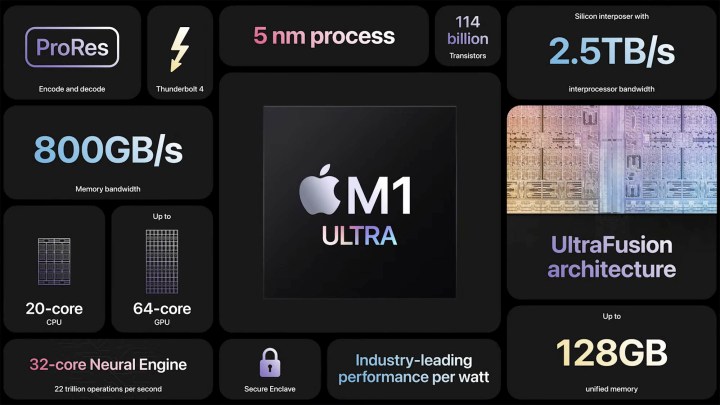Apple just revealed the upcoming M1 Ultra chip during its Peek Performance event — and that chip is said to boast unprecedented levels of power.
Today, several benchmarks of the chip have leaked, putting Apple’s words to the test and matching up the processor against Apple’s own silicon, as well as Intel and AMD chips.

The new Apple M1 Ultra chip will soon make its debut inside the $3,999 Mac Studio, so this is definitely a high-end processor aimed at professionals. Apple promises to deliver outrageous performance with its new chip, and even without seeing the benchmarks, that’s fairly easy to believe — after all, the M1 Ultra is made out of two M1 Max chips stitched together through a technology Apple has named UltraFusion. In theory, this should mean that the M1 Ultra is capable of twice as much as Apple’s current top-level chip, the M1 Max.
The M1 Ultra is a system on a chip consisting of a CPU, GPU, and RAM in a single chip. The benchmarked chip has a 20-core CPU, including 16 high-performance cores and four high-efficiency cores. One of the tests returned a base clock speed of 3.18GHz, but did not reveal the boost frequency. The test was done on a device running MacOS 12.3.
In a Geekbench test, the Apple M1 Ultra scored 1,793 in a single-core test and 24,055 in a multicore test. There’s no doubt that those are good scores, but how do they compare to the competition? Wccftech ran several comparisons and shared the results.
The first chip to match up against Apple’s new M1 Ultra was the Intel Core i9-12900K, which is the best processor of the Intel Alder Lake lineup. Assuming that the Apple M1 Ultra was running at its full power (which it most likely was), the chip was able to compete against the Core i9-12900K running at the same power. The M1 Ultra fell behind the Core i9-12900K in single-core performance, returning a 14% lower score, but it outperformed Intel by 20% in multi-threaded tasks.

The next comparison was with the AMD Ryzen Threadripper 3970X, a CPU mostly aimed at professionals and workstations taht’s equipped with 32 cores. It’s worth noting that the Threadripper consumes lots of power (280 watts) and the M1 Ultra is far more conservative in that regard, but even then, Apple beats Ryzen by a large amount. In single-core tests, M1 Ultra wins by 39%, but it loses to the Ryzen CPU by 7% in multi-core tasks. Apple also beats the top consumer CPU from AMD, the Ryzen 5950X, winning by 13% in single-core and a whopping 37% in multi-core operations.
Another interesting comparison is between the M1 Ultra chip and the Intel Xeon-based Mac Pro. The Mac Pro has more cores than the M1 Ultra chip, 28 versus 20, but unsurprisingly, the M1 Ultra still beats the Intel Xeon Mac by a considerable amount. It outperforms the Mac Pro by 21% in multi-core and a huge 56% in single-core tests. This lines up with Apple’s claim that the M1 Ultra Mac Studio would be 60% faster than the Intel Mac Pro.
Last but not least, the M1 Ultra was matched up against the M1 Max and the M1 Pro. Just as a reminder: The M1 Ultra scored 1,793 in single-core and 24,055 in multi-core. Its predecessor, the M1 Max, scored 1,770 in single-core and 12,448 in multi-core operations, with the M1 Pro trailing closely behind at 1,757/12,334. It seems that the M1 Ultra will be similar to previous Apple chips in single-core tasks, but it doubles the score of the M1 Max in multi-core operations.
These benchmarks paint a very exciting picture of the upcoming M1 Ultra and the $3,999 Mac Studio that will run on that chip. Unfortunately, they don’t mention GPU performance, which is another thing that would be fantastic to see — after all, the M1 Ultra can be configured to contain up to 64 GPU cores. For now, it’s best to keep expectations at bay and wait for the benchmarks that will undoubtedly pop up upon the release of the Mac Studio.



